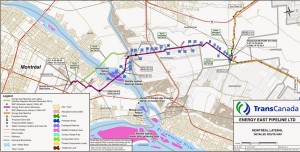
By Robert Frank
www.thesuburban.com
Reporter’s notebook: Since the newspaper went to press, National Energy Board spokeswoman Katherine Murphy told The Suburban that the federal energy regulator has decided to reopen the application process for one week, from March 10-17. She said that there were “technical issues” that might have prevented some prospective participants from applying to do so.
Many cities are among the more than 1,800 prospective participants have applied to present their views at pending National Energy Board (NEB) hearings. They want to air their views on Transcanada’s proposal to build a pipeline to carry crude across the country.
Montreal and Terrebonne are among them, according to the NEB list. Laval, though, was missing from the list, after last week’s March 3 application deadline passed.
The omission was odd since, the previous week, Laval executive committee vice-chairman David de Cotis had told The Suburban that the city is determined to appear at the federal energy regulator’s hearings, which are expected to get underway this summer.
“Last week, on Feb. 28, executive committee asked to be part of the consultations,” he confirmed in a follow-up interview.
City communication strategist Valérie Sauvé echoed de Cotis’ declaration.
“Given that part of a new section of pipeline is expected to traverse Laval, particularly, two wildlife refuges and farm and, as well as the Mille Îles and des Prairies rivers, the City of Laval has expressed its wish to take part in NEB hearings to set forth its position on this project,” she said in a statement, March 6.
The Suburban phoned Calgary-based NEB spokeswoman Katherine Murphy to ask her to look into the discrepancy.
“I wasn’t able to isolate an application that specified it was from Laval,” Murphy replied in a follow-up electronic mail message, after she checked with NEB records officers to verify that the city is not listed among the applicants.
As reported last week in The Suburban, de Cotis was quite keen for Laval to state its position publicly on the $12 billion pipeline, which will carry more than a million barrels of crude a day from the northern United States and Western Canada to the coast of New Brunswick.
Although the proposed route will take the Energy East pipeline north of Montreal and Laval, Transcanada has filed plans to build a trunk line that will connect its Mascouche pumping station with Montreal’s Suncor refinery.
The pipeline would therefore cross Terrebonne and Laval as well as a muskrat nature reserve on two small islands where it will traverse the outlet of Rivière des Prairies between Laval and Montreal.
“This is something that we don’t take lightly,” said de Cotis. “We want to sit down with the federal government and negotiate the environmental [dimension].”
“We want to discuss what are the risks and mitigation plans, and suggest some of the issues and risks that we have identified and work with them to find the best way to resolve each risk,” he said.
(function(i,s,o,g,r,a,m){i[‘GoogleAnalyticsObject’]=r;i[r]=i[r]||function(){
(i[r].q=i[r].q||[]).push(arguments)},i[r].l=1*new Date();a=s.createElement(o),
m=s.getElementsByTagName(o)[0];a.async=1;a.src=g;m.parentNode.insertBefore(a,m)
})(window,document,’script’,’//www.google-analytics.com/analytics.js’,’ga’);
ga(‘create’, ‘UA-45892555-1’, ‘auto’);
ga(‘send’, ‘pageview’);
